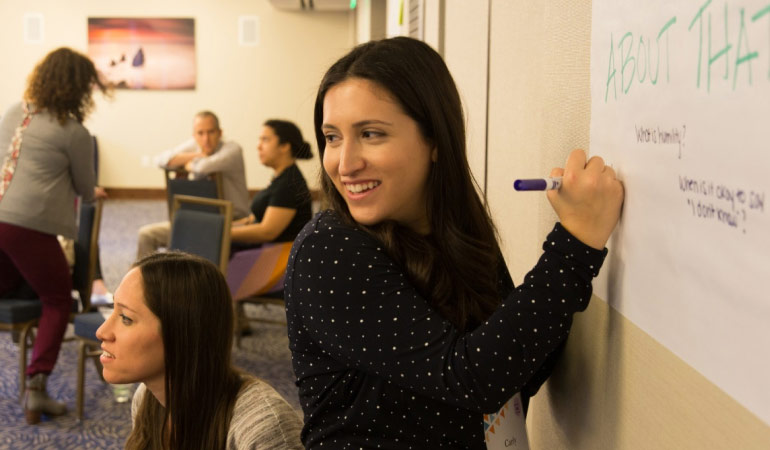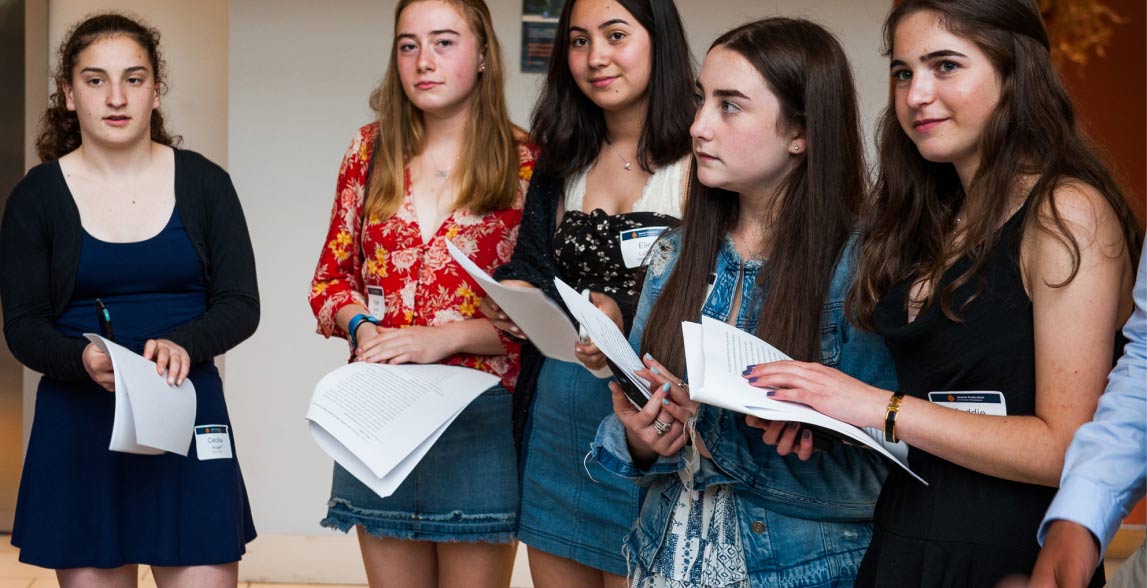Earlier this summer, members of the JTFN Youth Ambassador Council were looking to stay connected past the close of the 2019-2020 cohort year. Moved by current events and their experiences as young Jewish philanthropists, Emily Abrams (Detroit, MI) and Mazzi Katzen (Portland, OR) wrote the following piece to express their understanding of and commitment to anti-racism, standing up against injustice, and supporting their communities through the lens of Jewish values.
"It is our responsibility to take action."
Emily Abrams
Some of the most fundamental concepts in Jewish thought hold the pursuit of justice in high regard. My own Jewish identity has been shaped by my sense of responsibility and involvement in social action. This concept is shared and upheld by many American Jews. In fact, over half of participants in a study of U.S Jews conducted by the Pew Research Center in 2013 reported that “working for justice/equality” was essential for their American Jewishness. This modern belief is deeply rooted in Jewish tradition and core Jewish values, placing much significance on social responsibility and the pursuit of Justice.
One of my favorite Jewish values, as written in Deuteronomy 16:18 – 21:9: “Tzedek, tzedek tirdof: Justice, justice, you shall pursue,” teaches us to seek out injustice in our community and in the world. It helps us understand the importance of dignity, freedom, and the rights of others. It highlights how the belief in responsibility and social action is rooted in our Jewish identities. In this moment, where we see injustice being realized, we as American Jews need to act on this responsibility to support Black lives.
As a minority group that has also experienced discrimination in this country and throughout history, it is imperative that we are involved as active allies. We have a responsibility to support those seeking justice to rectify systemic disadvantages and social persecution in our country. The idea of Avadim hayinu b’mitzrayim encapsulates this very well. The phrase, “We were slaves in Egypt,” is used to empathize with the downtrodden. It is a reminder of our history and is a call to action. This quote is especially inspirational to me because it employs the understanding that we as Jews have our own history of persecution and maltreatment and that it is our duty to stand as an ally for victimized and oppressed groups. It is clear, that if we want to uphold these core values and beliefs, it is our responsibility to take action.
Currently, the world is facing a lot. There are many battles being fought such as the COVID-19 pandemic and the battle against racism through the Black Lives Matter movement. As a young Jewish woman who attended a Jewish day school her whole life, I grew up learning about Middot (Jewish values). But we always learned about them in the context of times in which they were written. However, now, I am seeing how these values can and should be applied in current times and within my own life. They can help guide us through life’s most complicated moments.
To help me dive deeper into these ideas, values and how they relate to the present moment, I reached out to Rabbi Ariel Stone of Congregation Shir Tikvah in Portland, Oregon. Rabbi Stone is a social activist and strong female leader in my community. During a long discussion, she enlightened me about some Jewish principles that can make a huge impact in the world right now.
The first value that we discussed was Pikuakh Nefesh. This value is more of an obligation for all Jews. It states that saving a life is the most important thing. Even if you break another mitzvah (law) to do so, saving a life comes before anything else. Currently, so many lives are at higher risk and it is our job to learn how to make compromises to help others. Something as simple as wearing a mask could be considered a mitzvah, as you are making a simple yet helpful compromise that could save others. We need to remember that our life does not come before anyone else’s. We are all part of this kehilla (community).

In Genesis 1:26-28 it states that all human beings are made in the image of God, meaning that everyone is created equal. God did not make anyone or any group of humans superior. We are all equally holy in God’s image. When people say “Black Lives Matter” this is at the heart of that notion. We must always remember that there is no superior being or beings and it is our job to fight against any injustice that says otherwise.
Finally, the Rabbi and I discussed, Tikkun Olam, the value of being your best self and repairing the world. This is a key value in Judaism and may seem intimidating. Where do we begin to repair the world with all the hardship and misfortune that it is faced with? Tikkun Olam, meaning to repair the world, is closely identified with social action. In my own experience, I have used philanthropy and tzedakah as a way of working towards Tikkun Olam. I have seen philanthropy make big impacts on my community and the word around me and it is a great tool that truly can help to repair the world. Jewish principles teach us that pursuing justice, giving tzedakah and following other mitzvot can lead to piecing the world back together. How does this relate to current times? Now more than ever the world is in need of repair. It is our duty to follow mitzvot and middot as best as we can. We need to help vulnerable populations and stand up against injustices we see in the world.
As we reflect on how to navigate during through these difficult times, it is essential to embrace our Jewish values, to use those values as a compass, and allow them to guide us towards making the world a better place.
